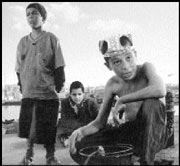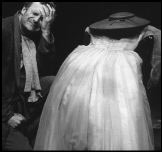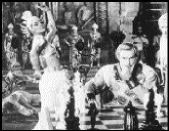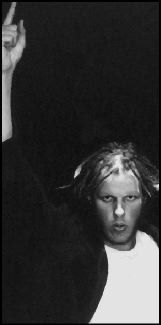ARAB AND IRANIAN FILM FESTIVAL
runs March 15-21 at Broadway Performance Hall
IN THE SIX months since Sept. 11, we’ve been flooded with books, television programs, and radio interviews attempting to “explain” the Islamic world. It’s hard to make the case that we haven’t been offered enough information on Islam, fundamentalism, and the Middle East.
Yet that torrent from talking heads has only taught us how little we still know. In this fifth annual showcase of cinema from Iran and the Arabic-speaking world, festival director John Sinno is determined to counter axis-of-evil rhetoric by letting filmmakers speak for themselves. His intent for the Western viewer, he explains, is that “you can feel like you’re living in Tehran, Cairo, or Morocco.”
Even when that goal isn’t always met, the opportunity is welcome in 14 features, one feature-length documentary, and two short-film packages. Most tell gritty, emotional stories of working-class life with nonprofessional actors. By putting the region’s seemingly intractable conflicts into human terms, they show how those conflicts overwhelm the people who live there. Even merely workmanlike filmmaking can be redeemed by fresh, authentic subjects.
A standout at SIFF last year, the opening-night Ali Zaoua: Prince of the Streets (7 p.m. Fri., March 15) chronicles the death of a Casablanca street boy and his companions’ decision to bury him like a prince. From Iran, Shrapnels in Peace (7 p.m. Sat., March 16) tells of a metal-scavenging lad who risks a border war minefield to raise his sister’s dowry. The festival’s closing-night feature, Under the Moonlight (7 p.m. Thurs., March 21), concerns an Iranian seminary student questing for a stolen package who encounters poverty outside Tehran that shakes his desire to become an Imam.
THE ALGERIAN Living in Paradise (9 p.m. Wed., March 20) contradicts charming images of early-’60s Paris with a City of Light that relies on immigrant Algerian laborers like Lakhdar. Homesick, he sends for his family, but the French bureaucracy won’t provide a decent apartment. Later, stuck in their shantytown shack with no running water, his children do math homework that ironically instructs them to compute how much is wasted by imaginary leaky taps. As Lakhdar becomes increasingly frustrated and desperate to provide for his family, his integrity erodes and he begins preying on his fellow Algerians. Finally, a friend reproaches him, “You’re acting like a Frenchman.”
Although unpolished, The Closed Doors (7 p.m. Wed., March 20) conveys the volatile mix of piety, politics, and modernity afflicting Egypt. Sexually awakening Mohamad spies on girls through the holes in the dilapidated walls of his school, and the infraction gains him rapped palms and extra study. Encouraged by his fundamentalist mosque, the increasingly moralistic boy tries to control his fiercely independent mother by insisting she wear the veil, quit her job as a maid for a corrupt wealthy family, and break with her prostitute friend.
Rarely screened in the U.S., we can count ourselves doubly fortunate to view such titles, since, according to Sinno, “Many are not shown in the countries of production. Some, like Saudi Arabia, don’t have movie theaters.” While a few Islamic countries have strong film industries (notably Egypt and Iran), there isn’t strong support for independent film, he explains, and many of these movies are jointly produced with European companies for E.U. markets (France, with its large North African population, is the largest).
If you come seeking conclusive answers about intifada, Osama, or Allah, you’re likely to be disappointed—but also perhaps encouraged to attend the following affiliated “Documenting Islam” series (March 22-24, Little Theatre). These movies will only draw more questions. One is why, outside of small festivals like this, we get so little chance to see them.
Schedule and information: 322-2564 and www.arabfilm.com.








